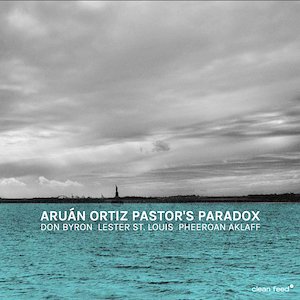Label: Clean Feed, 2023
Personnel - Aruán Ortiz: piano, voice; Don Byron: clarinet, bass clarinet, voice; Lester St Louis: cello (#1,2,4,5,6); Pheeroan AkLaff: drums + Yves Dhar: cello (#3,7); Mute Gant: spoken word (#1,4,6).
Cuban-born, Brooklyn-based pianist and composer Aruán Ortiz has consistently stood out as a notable voice in the vibrant New York creative scene. Following his remarkable trio album, Serranías (Intakt, 2023), a high-quality blend of contemporary Cuban-jazz hybridity, comes Pastor’s Paradox, another intriguing album with a distinct concept and sound. The bass-less quartet at the core of this seven-song cycle includes distinguished clarinetist Don Byron, with whom he recorded a duo album in 2018, adventurous cellist Lester St. Louis, and seasoned drummer Pheeroan AkLaff.
In celebration of his 50th birthday year and inspired by Martin Luther King’s iconic ‘I Have a Dream’ speech, Ortiz draws inspiration from themes of racial, women's, and Latino rights, adopting the form and structure of the activist’s transformative discourses. The music, often embracing a dark quality, is marked by subtle hooks and grand gestures, showcasing painstakingly rendered harmonies and melodies. This creates a disarming emotional directness juxtaposed with an indelible improvisational appetite.
The atonal and abrasive “Autumn of Freedom” features Mtume Gant, whose spoken word consists of fragments of Dr. King’s speech. He also stands out on “The Dream That Wasn’t Meant to be Ours”, a chimeric dissertation with its own plaintive melodic thrust that brims with AkLaff’s timbral magnificence via an expert toms and cymbal work. Mysterious and uncanny atmospheric sounds permeate this piece, much like on “Pastor’s Paradox”, a brooding, pensive dirge featuring dreamy bass clarinet, rasping cello tones, sparse yet tense piano chords, and single-note ambiguities, complemented by sounded percussion.
The slowly built “Turning the Other Cheek No More” elopes into a rapturous rhythm prior to long clarinet notes and continual terse incisions of guest cellist Yves Dhar who responds regularly to Byron’s assertive communication. Following striking improvisation, a dire crescendo takes listeners out of their comfort zone before a composed finale in unison. The pieces avoid obvious paths, and “From Montgomery to Memphis” is an avant-garde persuasion where Ortiz’s arpeggiated pianism serves as an anchor, providing guidance and support to Byron’s defiant phrases He has an additional back up in St. Louis’ pizzicato hops.
The album concludes with “No Justice, No Peace, Legacy!”, a ruminative, motivic, and driving number to which the band members lend their voices.Visibly benefiting from the like-minded musicians’ rapport, Ortiz’s Pastor’s Paradox is compelling in its music and vital in its message.
Favorite Tracks:
02 - Pastor’s Paradox ► 03 - Turning the Other Cheek No More ► 05 - From Montgomery to Memphis


